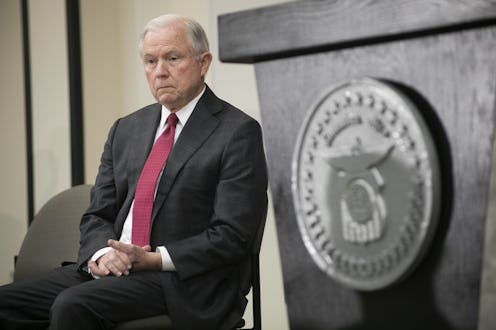News
The DOJ Will Cut Crime-Fighting Funds To Sanctuary Cities If They Don't Help Deport People

Attorney General Jeff Sessions is moving to make good on his threats to punish so-called sanctuary cities. In letters reportedly sent out Thursday, Sessions threatened to deny sanctuary cities federal resources to help combat crimes unless they assist Immigration and Customs Enforcement (ICE) agents in deporting and detaining those believed to be living in the country illegally.
According to the Associated Press, the Justice Department sent letters to at least four sanctuary cities, warning them they would be considered ineligible for the Public Safety Partnership, a new Department of Justice program designed to help cities curb drug trafficking and gang crime, unless they offered more assistance to federal authorities. Such help would reportedly include giving federal officers access to jails and advance notice when releasing someone known to be wanted on immigration violations. Letters were reportedly sent to Baltimore, Maryland; Albuquerque, New Mexico; and Stockton and San Bernardino, California.
"By taking simple, common-sense considerations into account we are encouraging every jurisdiction in the country to cooperate with federal law enforcement," the Associated Press reported Sessions said in the letters. "That will ultimately make all of us safer — especially law enforcement on our streets."
Earlier this week, Sessions said sanctuary cities could expect to lose millions in federal grants if they did not cooperate with immigration authorities. However, despite Sessions' repeated threats, it remains unclear as to whether the Justice Department or the Trump administration really have the authority to withhold federal funds from sanctuary cities. In April, a federal judge in San Francisco, California moved to temporarily block an executive order signed by President Trump, which attempted to tie federal funding to immigration enforcement.
Although Sessions has argued his hard-line on cooperation with immigration enforcement agents would increase public safety, officials of sanctuary cities vow they will do just the opposite. "We need to have people feel they can come forward and work with us without fear of being taken away," Philadelphia Police Commissioner Richard Ross told The New York Times after Sessions spoke at the U.S. Attorney's Office in Philadelphia, a sanctuary city.
The city's mayor also rebuffed Sessions' claims, arguing Philadelphia's sanctuary city policy enabled victims and witnesses of crimes to come forward without fear of deportation allowing the city to focus on getting "the real bad guys" off the streets.
Sessions' letter demanded law enforcement authorities from each of the four so-called sanctuary cities show proof of their compliance by Aug. 18 or risk being rejected from the Justice Department's Public Safety Partnership program.